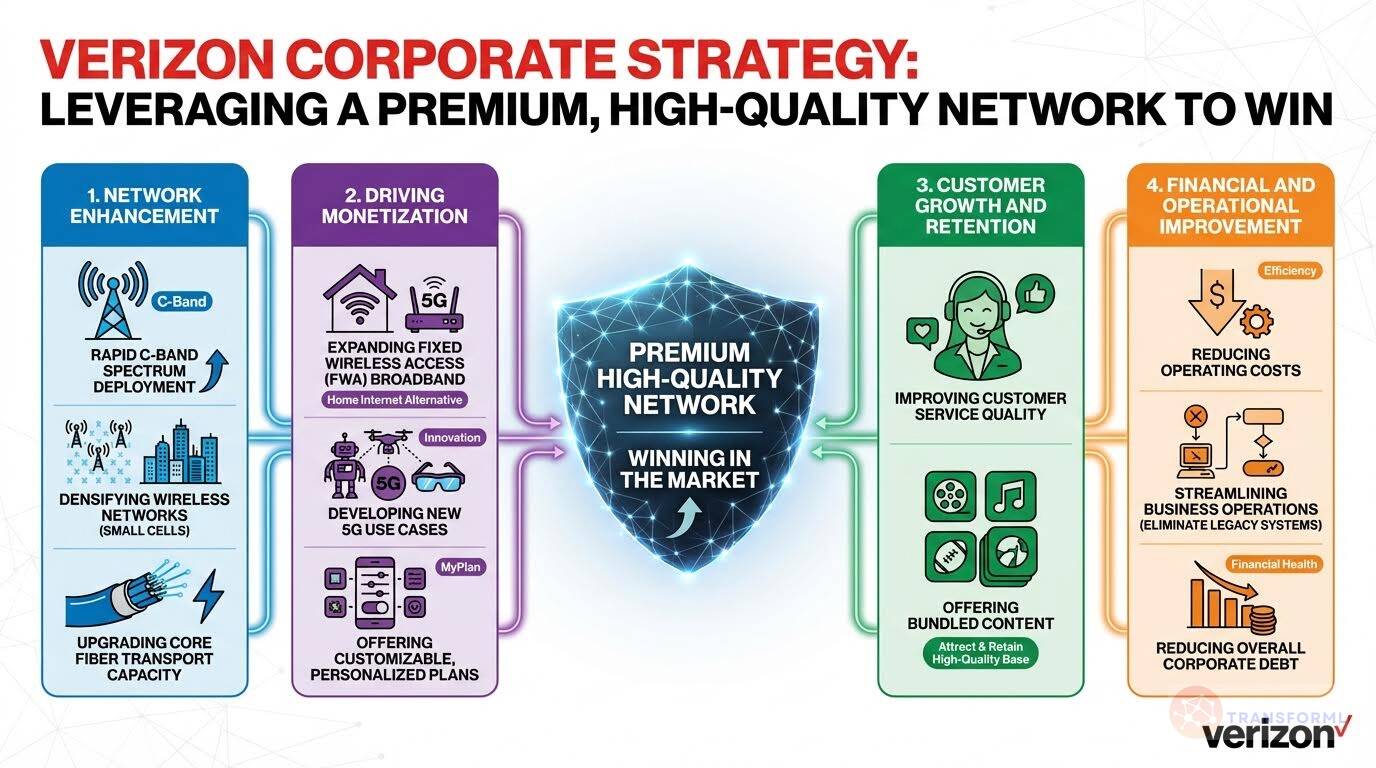Verizon Communications Inc. Strategy Analysis

Editor-reviewed by Ahmad Zaidi based on analysis by TransforML's proprietary AI
CEO, TransforML Platforms Inc. | Former Partner, McKinsey & Company
Strategy overview for Verizon Communications Inc.
Verizon Communications Inc. is a leading global provider of communications, technology, information, and streaming products and services. The company operates through two main segments: Consumer and Business, focusing on delivering data, video, and voice services and solutions designed to meet customer demands for mobility, reliable network connectivity, and security. Verizon is committed to enhancing its high-performing networks, driving monetization of its platforms, and improving financial and operational performance.

Key Competitors for Verizon Communications Inc.
AT&T Inc.
Extensive network infrastructure and a wide range of communication services.
T-Mobile US, Inc.
Aggressive pricing strategies and a strong focus on 5G network deployment.
Comcast Corporation
Bundled service offerings and a large existing customer base.
Charter Communications, Inc.
Significant presence in the cable and internet service markets.
Insights from Verizon Communications Inc.'s strategy and competitive advantages
What Stands Out in Verizon Communications Inc. strategy
Verizon's strategy is distinctively centered on leveraging a premium, high-reliability network as its core value proposition. While all competitors invest in their networks, Verizon's identity and 'How to Win' are most explicitly tied to 'Network Quality,' emphasizing reliability, speed, and coverage. This manifests in their aggressive C-Band spectrum deployment and network densification initiatives.
Secondly, Verizon's strategy to 'Drive Monetization' through Fixed Wireless Access (FWA) is a standout approach to competing in the broadband market. By leveraging its existing 5G infrastructure, it can expand its broadband footprint more capital-efficiently than competitors like AT&T, which is more singularly focused on a massive fiber buildout. Verizon's 846,000 FWA net additions demonstrate tangible progress with this distinctive tactic.
Finally, Verizon maintains a more overtly balanced strategic focus on both Consumer and Business segments, with specific goals and solutions tailored to large enterprises and the public sector, a dimension less pronounced in T-Mobile's consumer-centric 'Un-carrier' narrative.
What are the challenges facing Verizon Communications Inc. to achieve their strategy
A primary challenge for Verizon is its ability to compete on growth and value proposition against a highly aggressive T-Mobile. T-Mobile's strategy has yielded superior customer growth (6.1 million postpaid net additions vs Verizon's 1.3 million) by leading with a compelling 'best value' narrative that includes rich perks like bundled streaming services (Hulu, Netflix).
Verizon's focus on 'customizable plans' appears less potent in comparison, making it difficult to 'Retain and Grow' its customer base, especially among price-sensitive users. A second major challenge is the lack of a singular, powerful strategic narrative compared to its peers. AT&T has clearly defined its future around 'Converged Connectivity' (deeply integrating fiber and wireless), while Comcast leverages its massive 'Content & Experiences' arm (NBCUniversal, Peacock) for unique bundling opportunities.
Verizon's strategy, while solid in its components, lacks a similarly cohesive and marketable overarching theme, potentially weakening its competitive positioning. Lastly, Verizon's high debt load ($144.0 billion) and capital-intensive network strategy create significant financial pressure. While competitor AT&T also carries high debt, T-Mobile demonstrates a more capital-efficient model with higher growth. Verizon's strategic imperative to 'Reduce Indebtedness' may constrain its ability to invest or compete on price as aggressively as its rivals, creating a persistent tension between network enhancement and financial discipline.
What Positions Verizon Communications Inc. to win
Extensive Network Infrastructure
- Verizon possesses one of the most extensive wireless networks in the U.S., providing a strong foundation for its service offerings. The company operates a national network covering over 146 million wireless retail connections.
5G Technology Leadership
- Verizon is at the forefront of 5G wireless technology, driving industry standards and developing ecosystems for fixed and mobile 5G services. The company is leveraging its breadth of wireless spectrum, including millimeter wave and C-Band spectrum, to improve 5G coverage and densification.
Strong Financial Performance
- Verizon demonstrates solid financial performance with substantial revenue, operating income, and cash flows from operations. The company's financial stability enables it to invest in network enhancements and strategic initiatives.
Diverse Service Offerings
- Verizon offers a wide array of services, including wireless, wireline, broadband, data, video, and advanced communication services, catering to both consumer and business customers. This diversification reduces reliance on any single service.
Strategic Investments in Fiber
- Verizon is strategically expanding its fiber-based networks to support growing bandwidth demands and provide customers with integrated wireless and wireline broadband services. The planned acquisition of Frontier Communications is expected to enhance Verizon's fiber broadband footprint.
Robust Distribution Channels
- Verizon utilizes a combination of direct, indirect, and alternative distribution channels to market and distribute its products and services. This includes company-operated stores, sales and service centers, business direct sales teams, digital channels, and partnerships with retailers and agents.
Commitment to Network Reliability
- Verizon prioritizes the reliability, speed, capacity, coverage, and security of its wireless network. The company invests in network testing, maintenance, and backup systems to ensure high availability and performance.
Human Capital Resources
- Verizon invests in its workforce through human capital programs and practices that support, develop, and care for employees. The company focuses on attracting and maintaining a diverse workforce, offering educational opportunities, and providing career advancement opportunities.
What's the winning aspiration for Verizon Communications Inc. strategy
Verizon aims to be a leader in the communications, technology, and information sectors by leveraging its high-performing networks and diverse service offerings to meet the evolving needs of consumers, businesses, and government entities. The company aspires to drive growth through network monetization, customer base expansion, and operational efficiency.
Company Vision Statement:
Company Vision Statement - To be one of the world's leading providers of communications, technology, information and streaming products and services to consumers, businesses and government entities.
Where Verizon Communications Inc. Plays Strategically
Verizon strategically focuses on the U.S. market, serving both consumer and business segments with wireless and wireline communications services. The company is expanding its fiber-optic network and exploring growth opportunities in fixed wireless access (FWA) broadband and IoT services.
Key Strategic Areas:
How Verizon Communications Inc. tries to Win Strategically
Verizon aims to win by leveraging its high-performing networks, particularly its 5G and fiber infrastructure, to deliver reliable and innovative services. The company focuses on providing a compelling customer experience through customizable offerings, strong network reliability, and strategic partnerships.
Key Competitive Advantages:
Strategy Cascade for Verizon Communications Inc.
Below is a strategy cascade for Verizon Communications Inc.'s strategy that has been formed through an outside-in analysis of publicly available data. Scroll down below the graphic to click on the arrows to expand each strategic pillar and see more details:
Enhance Networks
Consistently deploy new network architecture and technologies to secure leadership in both 5G and 4G wireless networks.
Continue to Deploy C-Band Spectrum
Continue the rapid deployment of C-Band spectrum across the continental U.S. to improve 5G wireless service coverage and capacity.
Densify Wireless Networks
Increase network density by utilizing macro and small cell technology, in-building solutions, and distributed antenna systems to improve coverage and quality of service.
Upgrade Fiber Transport Capacity
Upgrade and increase long-haul core fiber-based transport capacity to respond to growing bandwidth demand and support international operations.
Leverage the Benefits of Cloud Computing
Leverage the benefits of cloud computing and storage by evolving the network infrastructure to a private cloud infrastructure.
Drive Monetization
Focus on enhancing and driving the monetization of networks, platforms and solutions.
Provide FWA Broadband
Expand the availability of FWA broadband through 5G and 4G LTE networks to both Consumer and Business customers as an alternative to traditional landline internet access.
Develop New 5G Use Cases
Develop and promote new and innovative products and services that leverage the capabilities of 5G technology to drive revenue growth.
Offer Customizable, Personalized Phone Plans
Offer customizable, personalized phone plans for retail customers, allowing them to design the plan that fits their needs, including access to their preferred content and services.
Promote Value-Added Services
Increase sales of non-connectivity services such as device protection, content offerings, and cloud storage to Consumer customers.
Retain and Grow Customer Base
Retain and grow high-quality customer base by delivering what customers want and need in the digital world.
Improve Customer Service Quality
Enhance the quality of customer service to improve customer satisfaction and reduce churn.
Offer Bundled Premium Content
Offer service plans that include additional bundled premium content or other perks to attract and retain customers.
Expand Value Brand Marketing
Increase advertising and marketing spend to promote value brand offerings and attract price-sensitive customers.
Target Verizon Customers
Offer aggressive pricing, promotions, and other incentives specifically targeting Verizon customers to retain their business.
Improve Financial Performance
Further improve financial and operating performance through cost efficiencies and strategic investments.
Reduce Operating Costs
Implement initiatives to reduce operating costs and improve operating efficiencies across all business segments.
Optimize Capital Expenditures
Carefully manage capital expenditures to ensure efficient allocation of resources and maximize return on investment.
Streamline Business Operations
Simplify operations by eliminating legacy network elements and streamlining business processes.
Reduce Indebtedness
Reduce the company's high level of indebtedness through various initiatives.
Evolve Network Infrastructure
Evolving and transforming networks to ensure customers receive access to the best network possible, including 5G wireless, fiber transport, and IP networking.
Improve Network Energy Efficiency
Improve the energy efficiency of networks, facilities, and fleet by using more energy-efficient equipment and pursuing opportunities to use renewable energy sources.
Build Local Fiber Networks
Continue building local fiber networks by adding fiber connectivity to premises, venues, cell tower locations, and data centers.
Upgrade IP Network Capacity
Increase IP network capacity and efficiency to support growing bandwidth demand.
Integrate Frontier Communications
Successfully integrate Frontier Communications to enhance fiber broadband footprint and provide opportunities for future Fios growth.
Manage Regulatory Landscape
Proactively manage the regulatory environment to minimize restrictions and ensure operational flexibility.
Advocate for Wireless Spectrum Access
Actively participate in FCC spectrum auctions and advocate for policies that ensure access to sufficient spectrum for future growth.
Comply with Open Access Regulations
Ensure compliance with open access FCC regulations, allowing customers to use devices and applications of their choice.
Monitor Broadband Regulations
Monitor and respond to regulatory developments related to broadband internet access services, including net neutrality and digital discrimination rules.
Address Public Safety Concerns
Address public safety concerns by regulating emergency communications services and mandating widespread availability of emergency alerting services.
Cultivate Human Capital
Attract, develop, and inspire a diverse workforce with the necessary skills and talent to execute on business priorities.
Attract and Maintain a Diverse Workforce
Maintain a diverse workforce with the necessary skills and talent to execute on business priorities.
Develop Our Employees' Potential
Offer educational opportunities that keep pace with changes occurring across our industry.
Inspire Individuals to Build a Career at Verizon
Provide meaningful work and opportunities for career advancement in a collaborative and inclusive environment.
Renegotiate Labor Contracts
Renegotiate labor contracts with the Communications Workers of America and the International Brotherhood of Electrical Workers to ensure competitive compensation and benefits packages.
Source and Disclaimer: This analysis is based on analysis of Annual reports for 2024. For informational purposes only (not investment, legal, or professional advice). Provided 'as is' without warranties. Trademarks and company names belong to their respective owners.
